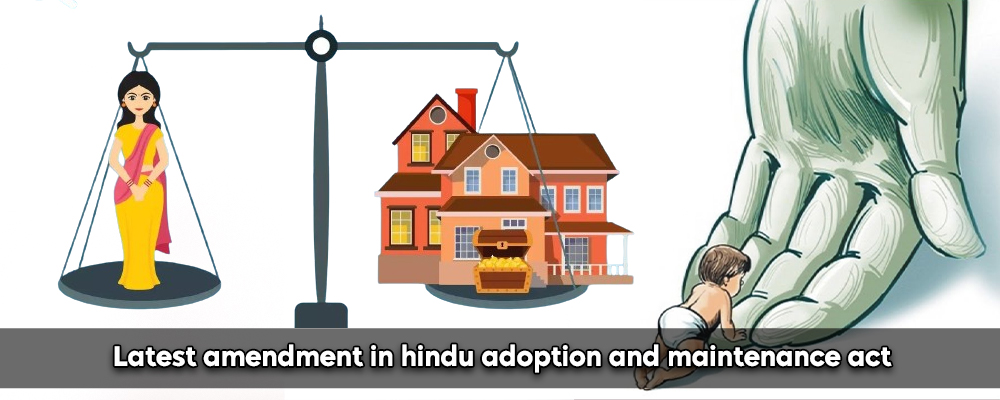By referring to a child rather than a son, the Hindu Adoption and Maintenance Act has significantly expanded the term “adoption.” A child is not just a son; it also contains a girl and a boy. The act’s procedures are necessary for any adoption because, as society has evolved, codified and consistent laws have become necessary to support democracy. Any adoption that is made without following this legislation would be deemed null and invalid. Only adoptions completed by this Act will be recognized as genuine adoptions.
Need A Legal Advice
The internet is not a lawyer and neither are you. Talk to a real lawyer about your legal issue

Who can adopt a child?
A person needs to be a Hindu and capable of adopting a child to do so. Hindu women who want to adopt must follow Section 8 of the same statute, while Hindu men who want to adopt must fulfill the standards outlined in Section 7 of the act.
A Hindu man’s ability to adopt.
According to Section 7, a male Hindu who wishes to adopt a kid must meet the requirements listed below:
- Reached the majority age and possessed a sound mental state.
- Has to have a surviving wife, whose approval is a must.
- If the woman is unable to give consent because of her insanity or another condition, it may be disregarded.
- Adoption requires approval from each of a person’s wives if they have more than one.
The capacity of a Hindu female to adopt.
- Be of sound mind;
- Have reached the age of minority;
- To be eligible for adoption, a person must be a widow, divorced, or single.
Who can give a child up for adoption?
As per Section 9 of the Hindu Adoption and Maintenance Act, a child can only be placed for adoption by their parents or legal guardian. According to the Act:
His biological father can only place a child for adoption; the child’s biological mother must also give her consent.
A mother may place her child for adoption if she meets certain requirements:
- Either the father has passed away;
- Mentally unstable;
- Has given up on life; or
- Has converted to a different religion.
The father and mother refer to biological parents, not adoptive parents, as the section makes clear. The adoptive mother or father cannot offer the child up for adoption again.
Can a child be up for adoption by the guardian?
According to Section 9 of the act, a guardian is a person designated by the child’s parents or the court to look after the child and his or her belongings. The guardian may place the child for adoption if his biological parents have passed away, given up on life, gone insane, or abandoned him.
However, the court’s approval is required before a guardian can surrender a child for adoption. Before granting such permission, the court must be convinced that:
- The adoption is being done for the child’s welfare;
- No money of any kind has been exchanged for the child.
When is an adoption legally binding?
Only a Hindu who complies with the requirements outlined in Section 6 of the act is eligible to adopt a child under Hindu adoption law: The adoptive parent(s) is/are capable of adopting; the person(s) offering up the child for adoption is/are capable of doing so; the individual up for adoption is/are capable of being taken in adoption; and the adoption is completed by the law.
Amendment
To facilitate international adoptions, the Central Government announced the Adoption (Amendment) Regulations, 2021, which amended the Adoption Regulations, 2017.
- Procedure for Children Adopted under the Hindu Adoption and Maintenance Act, 1956, by Parents desiring to Relocate Child Abroad is a new chapter added. This chapter applies to:
- All adoption cases by prospective adoptive parents or adoptive parents living abroad under the Hindu Adoptions and Maintenance Act, 1956.
- Every adoption-related case involving nations not party to the Hague Adoption Convention.
- Any Hindu who wishes to adopt a child born to Indian Hindu parents and lives abroad regularly may get in contact with an approved foreign adoption agency, the Central Authority, or the relevant government department (if the country is not party to the Hague Adoption Convention) in their country of habitual residence, as the case may be.
- The adoption deed must be jointly presented by the parties to an adoption finalized under the Hindu Adoptions and Maintenance Act, 1956, to the District Registrar and the District Magistrate in copy.
- SCHEDULE XXXIII, which deals with the Verification Certificate for Adoptions Concluded under the Hindu Adoptions and Maintenance Act of 1956, was introduced.
Lead India provides a variety of legal services, including free legal advice and online information. Here, you can ask a legal question and talk to a lawyer.





 Talk to a Lawyer
Talk to a Lawyer